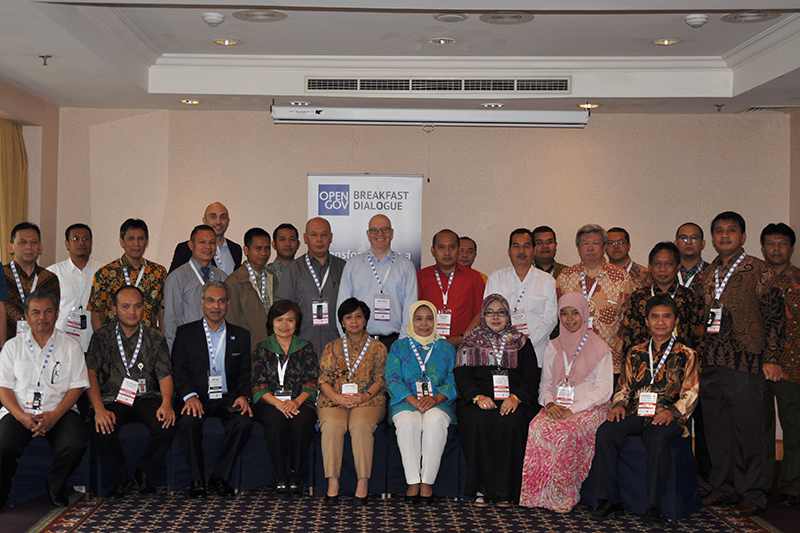
OpenGov and its partner Polycom held an informative breakfast dialogue (29 Oct) with Indonesian ICT leaders from public sector, healthcare and education to discuss the benefits of Unified Communications. 33 attendees from 17 unique agencies, hospitals and universities came together to discuss the future of the workplace.
Mr. Peter Harrison, Head of Infrastructure and Support at the Department of Child Protection and Family Support in Australia, said, “When you have 2,500 users spread across 150 sites spreading over 2,500,000 sq kms… you need something that works, a solution that is reliable and secure.”
The solution lies within video conferencing and it achieves the following:
-
Improved collaboration between District Offices
-
Improved collaboration between Head Office and Districts
-
Interoperability with other Government Agency Network
-
And Ease of Installation and use
Video conferencing has a direct impact and you can see tangible benefits right away – Reduction in travel costs, accommodation and meals. Fatigue Management was top of the list, employees did not have to waste time travelling for a weekly meeting. This resulted in more family time and increased efficiency. Mr. Harrison finished off by telling the delegates that the CIO of his department works 3 days in the office and 2 days from home. Yet, he is never out of touch. When they are on a call, they switch to video conference to get the job done. It’s almost like they are having a conversation in his office.
This example got the room talking…. Working from home would be a brilliant idea. It would ease traffic, reduce C02 emissions and increase morale. However, this got the delegates to thinking… what works in Western Australia, would it work in Indonesia? This is due to the mind set in Indonesia being that if you are not ‘physically” in the office you are not working.
Marc-Alexis Rémond, Senior Director, Industry Solutions & Market Development, Worldwide from Polycom agreed to the consensus. He said that in parts of Asia because of the joint family set up, the perception is when you are at home you cannot work. This is very different to the west, where the home office is considered to be more of the norm. He pointed out that the mindset was similar in Japan. “But they tackled this problem by setting up offices outside the city where the employees lived. These were near trains and public transportation and away from the city centre. “Because of technology, you know when an employee logs in and what work they are doing. There is a shift towards ‘result based’ management system and not hourly," Mr. Rémond emphasised.

When the audience was asked “ What is the biggest challenge to the adoption and utilisation of video conferencing? 56% of the audience responded “Limited Bandwidth”, 22% stated “Difficult to integrate with other systems and solutions” Mr. Rémond pointed out that, “interoperability is a must when choosing a system, for it must have ‘open standards’ to ensure it can communicate with others.”
Delegates raised the point of employee unhappiness with video conference. “People in remote areas feel left out of not visiting the capital.” For them, it is a sign of prestige to tell staff and others that, “I have to to go to Jakarta for a meeting,” a delegate said.
‘Video conferences does not replace face-to-face interaction. That should happen every 6 months. “In fact it increases the value of the face-to-face meeting,” said Mr. Rémond.
What model of video and collaboration delivery do you prefer now? 50% of the audience wanted a mix of both ‘cloud service’ solutions and ‘on-premise’ solutions. This is because, ‘some of the information is highly classified” stated Mr M Sutomo, Chief of Information Security and Cryptography, Ministry of Defence.
Conversation quickly moved onto connectivity. Indonesia is going through a transition. 4G connectivity is only available in Jakarta City at the moment. When you hit the outskirts, connectivity drops to 3G or even lower. Mr. Rémond pointed out that the fastest way to get connectivity in Indonesia would be via satellite. He said, “India has dedicated satellite bandwidth for telemedicine in rural India as a priority.”
The audience was then asked – What is the biggest driver in the use of video conferencing for your organisation? 54% said ‘To increase collaboration and coordination with other government agencies’. The 2nd biggest driver was ‘To improve access and quality in rural areas’.
Mr Acep Irawan, Deputy Director for Information System, Ministry of Finance and Sri Hartati, Head of Central Financial (IS & Tech), Ministry of Finance discussed how recently they rolled out video conferencing with a focus on education and training.

Video capabilities are now available on tablets, smartphones and laptops. Which application will benefit your organisation the most? 67% want Telework & Mobility solutions. Everything must be on the go.
Video conferencing pushes Indonesia closer to digital transformation. The need for these capabilities is clear. By connecting more seamlessly to each other, agencies can spur further collaboration and greater initiatives.
















